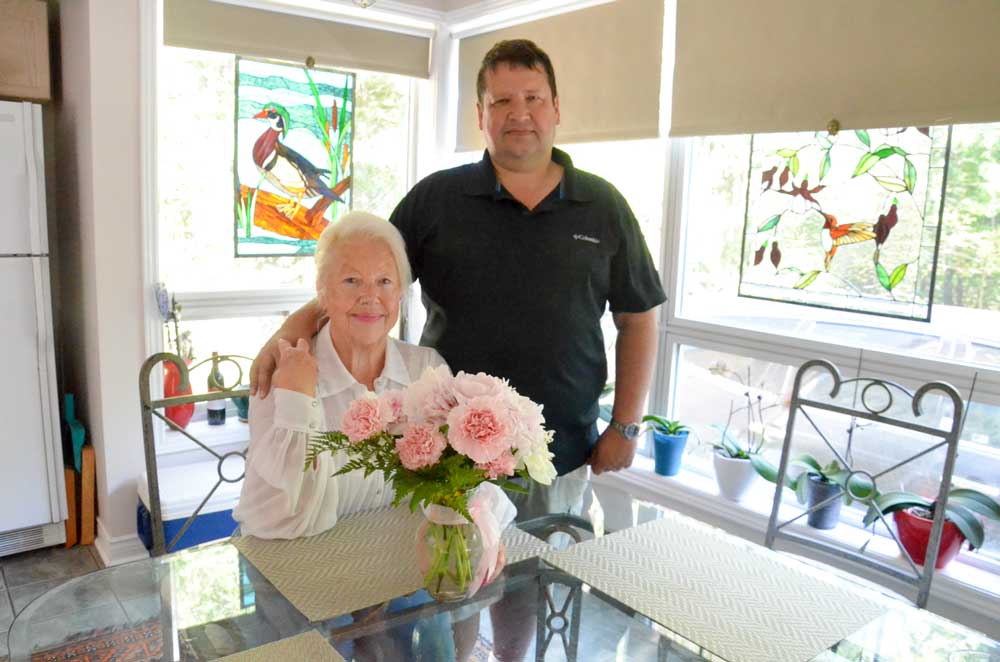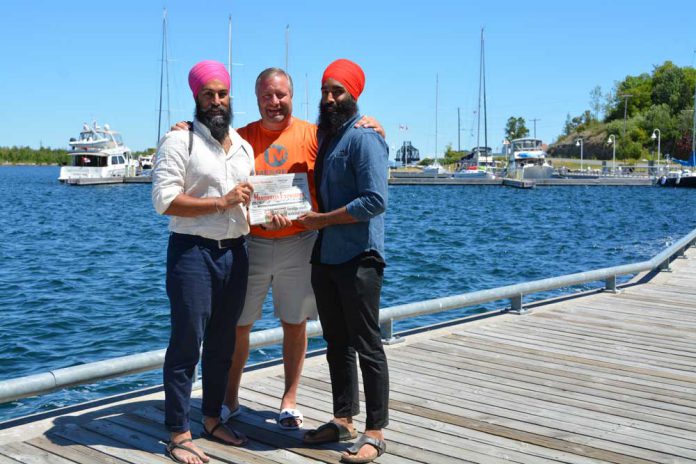Alice Rochat’s last wish is to be an advocate for those on Manitoulin
HONORA BAY—The woman sitting across the kitchen table from me is a bright, humourous and oh-so-very lively 76-year-old—and by the time you are reading this article she is almost certainly dead. Alice Rochat’s passage from this life is slated to be Manitoulin Island’s very first medically assisted death. As she completes her preparations for life’s final journey she wants you to know that “there is nothing to be afraid of.”
Ms. Rochat recently contacted The Expositor to ask if this paper would be willing to have a conversation with her about the decision she made to end her life under Canada’s new assisted dying legislation. “I want to be an advocate for the people of this beautiful island,” she said. “To help them understand better what is involved and how they now have a choice in how they wish to end their lives.”
We meet in Ms. Rochat’s immaculate cottage, nestled privately within a cedar wood located on Manitoulin’s northern shore. It is a bright sunny day and the world around us is full of life. Ms. Rochat’s son, Canadian Air Force Pilot Captain Marcel Rochat, joins us at the kitchen table as we start to discuss her death by exploring a little bit of her life.
Born in Zurich, Switzerland, Ms. Rochat grew up in that mountainous country that, in many ways, acts as a crossroads for Europe. “I was a businesswoman, married, had a kid, divorced, found another man and moved here,” she said, neatly summing up her life prior to 1979. The business she built in that earlier life was an agency that provided translation services.
“I have lived half my life here in Canada now,” she said.
Her new partner worked at INCO, the mining giant around which the Sudbury economy rotated for generations. It wasn’t long before Ms. Rochat became restless. She is not one for being idle. “I said to myself, ‘I have to have a business here, I can’t just sit around’,” she explained. After some research she opened a Mr. Donut franchise, then a second. There was plenty keeping her busy then, not to mention being an early example of the sandwich generation. “I had my dad with me,” she said. “After eight years we decided to sell and retire early, so that’s what we did.”
The couple had a summer cottage in McGregor Bay and they moved from their home located on the hills between the Memorial and Sudbury General Hospital and settled into life in the bay. “We had a place in Florida as well, but when my partner got sick, travelling in and out by boat came to be too much,” she said. They began to look for something more accessible. “We settled here,” she said, referring to the Honora Bay home. “My partner loved Manitoulin Island,” said Ms. Rochat. “It is beautiful, the whole Island is so beautiful—and the people.”
Like so many before her, Ms. Rochat watched her partner die a slow and painful death. She came to a firm decision about her own life.
“I said to myself, ‘I am not going to go like that’.”
When five years ago a diagnosis of terminal lymphoma came her way, Ms. Rochat knew what had to be done. “I always said that if I get sick I am jumping on a plane and going there (Switzerland).”
Ms. Rochat still held dual citizenship, having gained her Canadian citizenship but she also retained her connection to Switzerland. Legislation in her native Switzerland permitted medically assisted death at the time; Canada had yet to embrace that option. It was not until 2016 that medically assisted death became an option in this country.
In February 2015, the Supreme Court of Canada ruled in Carter v. Canada that parts of the Criminal Code needed changing to meet the requirements of the Canadian Charter of Rights and Freedoms, specifically that those parts of the law that prohibited medical assistance in dying were invalid. The Supreme Court gave the government until June 6, 2016 to create a new law. That law has now been in place for two years, but until now no one on Manitoulin Island has exercised that option.
Medically assisted death used to be referred to as medically assisted suicide, but the pejorative and legal connotations of the term “suicide” has led to it falling out of use for the procedure.
When her partner died, Ms. Rochat began making the connections she would need should the occasion arise. “I joined a club (Dignitas, a Swiss non-profit members’ society that provides assisted death to members who suffer from terminal illness and or severe physical and/or mental illness),” she said. “If medically assisted death had not become available in Canada I guess I would be on a plane right now.”
Instead, Ms. Rochat was able to explore that option in her chosen home and said she was very pleased by what she discovered.
“There is good support and the medical team here has very good people,” she noted.
For most of the past five years Ms. Rochat has had a good quality of life, despite of her diagnosis. “I have been very lucky,” she said. “I have had relatively good health and without pain.” She chose to eschew chemotherapy, particularly since the process would have impacted her remaining quality of life and she felt therapies would only have extended the later stages of cancer, leading to existence simply for existence sake. “Why should I live in terrible pain?” she asked.
Ms. Rochat used her remaining time to check off things on her bucket list. “I had a wonderful time,” she said. “I went to Alaska, Cuba, I used the last few years I had well.”
“But recently things began to go badly,” she said. Her health deteriorating and pain becoming intense, Ms. Rochat sought prescription relief, but there was a key complication. “I am allergic to morphine,” she said. Still, her doctors were able to delve into modern pharmacopeia to find something that worked outside the opioid family. “There is good support and a medical team, there are good people here,” she said. “With the pain medication I am good now.” She admits that the pills leave her a little fuzzy, “and some times a little bit aggressive,” but judging from her conversation with The Expositor, she must have started out one sharp woman, because there was no indication of any cognitive impairment during the interview and she was nothing but the epitome of grace throughout.
As Ms. Rochat began to go through the process of accessing medically assisted death, she was subjected to a battery of thorough interviews to determine if she met the criteria. “You don’t want to wait too long, you have to have all of your marbles,” she said, pointing to her temple. Should dementia or some other cognitive impairment set in you do not qualify.
“I guess that makes sense,” she said. “Sometimes there might be someone pushing the person into applying for medically assisted death so they can get their money.”
Those applying for medically assisted death in Canada must also be facing a terminal illness from which there is no reasonable hope of recovery and death would be imminent in any case. “You can’t just be in pain or suffering from a mental illness,” notes Ms. Rochat.
The entire interview process is taped.
Once you have signed the application for medically assisted death, you have 10 days in which to retract your request, but Ms. Rochat advises extreme caution. “If you revoke your signature, you can’t go back.” She recalled someone she knew whose pain abated and decided to not go through with the medically assisted death process. But pain the medication could not overcome came back and “he could not renew,” she said. “He died in terrible pain.”
As there was no local medical professional who has experience with medically assisted death, a doctor from southern Ontario came up to begin the process, and a doctor from Elliot Lake will come to her home when the final day arrives. “The new doctor from down south has done it 40 times now already,” she said.
“Dr. Cooper and a nurse practitioner will be here to observe and learn,” she said, pronouncing herself pleased that her death will be a teaching moment so Island residents will have access and the comfort of dealing with familiar faces when they seek the release of medically assisted death for themselves.
The process itself is fairly straightforward and has a number of safeguards to ensure that the medically assisted death will move to completion. “They put two lines into each arm,” she said. “In case one does not work.”
A sedative helps to relieve any anxiety and the patient “within two minutes, you drift off to sleep, very gentle, very beautiful,” said Ms. Rochat. “You say ‘nighty night’ and that’s it. The coroner comes and signs and it is done.”
Ms. Rochat’s son said that he is “pretty much of the same mind” as his mother. “Maybe it is my Swiss upbringing, maybe it is my profession,” he said of sharing his parent’s practical approach to death. Mr. Rochat is no stranger to death, he lost one of his own children, a baby born with heart issues who was the youngest heart transplant patient at the time. “We were living in Edmonton at the time, so there was great medical support,” he said. But it wasn’t enough.
As he recalls that terrible time the seasoned air force pilot’s face remains stoic. His mother gets up from the table and fetches him a tissue for his eyes.
“Every province is different,” said Ms. Rochat, once again picking up the narrative. “There is a number to call, they take your story, they tape everything. They said ‘if you don’t hear back from us in a week call back’.” She called back.
“Lots of doctors don’t want to do this,” Ms. Rochat said of medically assisted death. “Nurse practitioners can do it, but they have to refer you.”
Cost is no barrier to medically assisted death as “OHIP pays for everything,” she said. “I didn’t pay a cent.”
As to religious concerns, Ms. Rochat acknowledges that may be a barrier for some, including medical professionals, but said religious barriers were not an issue for herself. “I was raised religious,” she said. “But I am now what you might call spiritual, agnostic. I have certain beliefs, but I believe everything around us has a spirit. I believe in nature.”
Ms. Rochat said that she was glad that medically assisted death became available in this country. She said that she hoped her pioneering journey down the path to medically assisted death would help others with their own decision when facing an inevitable and painful death.





